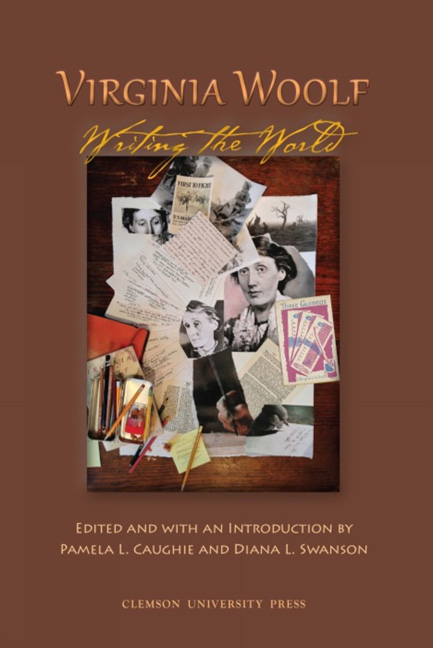Book contents
- Frontmatter
- Table of Contents
- Introduction
- Acknowledgmen
- Abbreviation
- WAR AND PEACE
- Roundtable: Woolf and Violence
- Intersections: Surveillance, Propaganda, and Just War
- Modernism and Memorials: Virginia Woolf and Christopher Isherwood
- Taking Up Her Pen for World Peace: Virginia Woolf, Feminist Pacifist. Or Not?
- The Sex War and the Great War: Woolf's Late Victorian Inheritance in Three Guineas
- Sky Haunting: The British Motor-Car Industry and the World Wars
- The 1914 “Expurgated Chunk”: The Great War in and out of The Years
- “beauty, simplicity and peace”: Faithful Pacifism, Activist Writing, and The Years
- Virginia Woolf, Katharine Burdekin, and Britain's Cosmopolitan Musical Culture
- Death in the Air: Virginia Woolf and Sylvia Townsend Warner in World War II
- WORLD WRITER(S)
- ANIMAL AND NATURAL WORLD
- WRITING AND WORLDMAKING
- Notes on Contributors
- Conference Program
- Appendix: Virginia Woolf Conference Exhibit Items, Newberry Library
Intersections: Surveillance, Propaganda, and Just War
from WAR AND PEACE
- Frontmatter
- Table of Contents
- Introduction
- Acknowledgmen
- Abbreviation
- WAR AND PEACE
- Roundtable: Woolf and Violence
- Intersections: Surveillance, Propaganda, and Just War
- Modernism and Memorials: Virginia Woolf and Christopher Isherwood
- Taking Up Her Pen for World Peace: Virginia Woolf, Feminist Pacifist. Or Not?
- The Sex War and the Great War: Woolf's Late Victorian Inheritance in Three Guineas
- Sky Haunting: The British Motor-Car Industry and the World Wars
- The 1914 “Expurgated Chunk”: The Great War in and out of The Years
- “beauty, simplicity and peace”: Faithful Pacifism, Activist Writing, and The Years
- Virginia Woolf, Katharine Burdekin, and Britain's Cosmopolitan Musical Culture
- Death in the Air: Virginia Woolf and Sylvia Townsend Warner in World War II
- WORLD WRITER(S)
- ANIMAL AND NATURAL WORLD
- WRITING AND WORLDMAKING
- Notes on Contributors
- Conference Program
- Appendix: Virginia Woolf Conference Exhibit Items, Newberry Library
Summary
Governments fear expression of independent thought more than an army.
Leo Tolstoy, “Christianity and Patriotism” (1894) 532.The conscious and intelligent manipulation of the organized habits and opinions of the masses is an important element in democratic society. Those who manipulate this unseen mechanism of society constitute an invisible government which is the true ruling power of our country.
Edward Bernays, Propaganda (1928) 37.Sometimes I try to worry out what some of the phrases we're ruled by mean. I doubt whether most people even do that. Liberty, for instance.
The Diary of Virginia Woolf, 13 April 1918, 138.My first email on the day I presented this paper came from Edward Snowden! Snowden's letter—sent through the American Civil Liberties Union —was to celebrate the first anniversary of “the leak.” Here are his first words: “Technology has been a liberating force in our lives. It allows us to create and share the experiences that make us human, eff ortlessly. But in secret, our very own government—one bound by the Constitution and its Bill of Rights—has reverse-engineered something beautiful into a tool of mass surveillance and oppression. The government right now can easily monitor whom you call, whom you associate with, what you read, what you buy, and where you go online, and they do it to all of us, all the time.” As I revised this paper, I thought about the Edward Snowdens of our world, the increasing importance of whistleblowers, and their diminishing status. My epigraphs highlight the significance of “independent thought,” “invisible government,” and the meanings of “those phrases we're ruled by.” I re-read them more closely now, as our current world—in all of its contextual complexity—impinges upon them, expanding their meanings.
The concept of “control”—in its multitudinous uses—is resoundingly communicated by the epigraphs I have chosen.
- Type
- Chapter
- Information
- Virginia Woolf: Writing the World , pp. 23 - 29Publisher: Liverpool University PressPrint publication year: 2015



